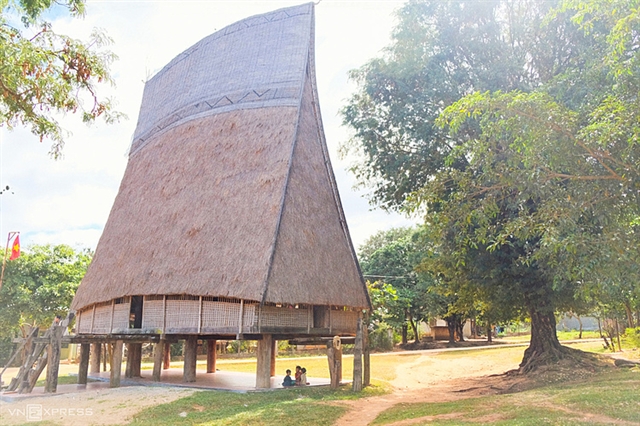Communal House In Central Highlands' Treasure Trove Of Childhood Memories


Kon Jo Dri is one of the oldest and largest communal houses in the Central Highlands. Photo vnexpress.net
HCM CITY — As one of the oldest and largest communal houses in the Central Highlands, Kon Jo Dri is part of the memories of many local village children.
Kon Jo Dri is a small village on the banks of Dak Bla River in Dak Ro Wa Commune of Kon Tum Town, home to the Ba Na ethnic minority.
The local communal house of the same name was built in 1977.
Considered the largest in the region with a height of 16m and width of 12m, it serves festivals, gatherings, New Year parties, cultural exchanges and traditional gong performances.
From the centre of Kon Tum, visitors have to pass over famous Kon Klor, the longest and most beautiful suspension bridge in the Central Highlands crossing Dak Bla River, to reach the small village of Kon Jo Dri. Kon K'Tu ancient village, about 2km from Kon Jo Dri, is another local gem.
Local boat rides offer an ideal means of exploring Dak Bla River. – VNS
Submarine DeepView24 To Serve Visitors At Vinpearl Nha Trang
US dollar billionaire Phạm Nhật Vượng, Chairman of Vingroup, will put into operation DeepView 24, a spectacularl... Read more
Bánh Khọt A Must-try At Vũng Tàu Beach
Bánh Khọt (mini savory pancake) is a great breakfast dish that visitors must try when staying at Vũng Tàu beach... Read more
Explore The First Museum In Southern Việt Nam
The HCM City Museum of History is located at Nguyễn Bỉnh Kiêm Street in District 1, set beside Saigon Zoo and Bota... Read more
Explore Hidden Waterfall In Central Việt Nam
Tà Puồng Waterfall is one of Việt Nam Central’s most impressive natural sights, with an unspoilt beauty. Read more
Bat Pagoda, Home Of Thousands Of Bats In Mekong Delta
The Cửu Long (Mekong) Delta is home oi about 600 Khmer pagodas and each temple has a unique feature. The Bat Pago... Read more
100-year-old Bửu Sơn Pagoda Rests On One Pillar
The 100-year-old Bửu Sơn Pagoda in Đồng Nai Province, built in the 18th century, rests on only one pillar. Read more

